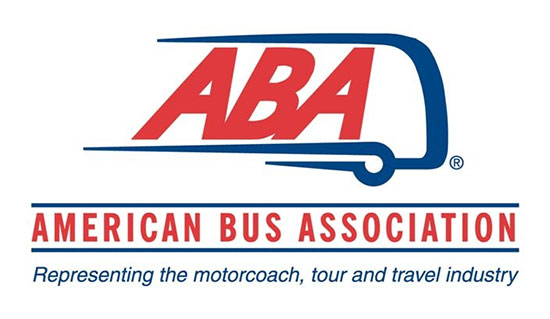- Details
- Category: Industry News
Last Friday, April 22, marked the 52nd observation of Earth Day, which represents the birth of the modern environmental movement. The American Bus Association used the occasion to call attention to the critical role that the motorcoach industry plays in helping the environment.
Calling them the “unsung heroes of transportation,” ABA noted that buses are among the greenest forms of transportation by taking up to 50 individual vehicles off the road. Buses shuttle millions across the country to work and school, the airport, running errands, for vacation, senior and low-income transportation, military movement, and in times of crisis like natural disasters. Buses are even being used by major airlines to help transport passengers between airports amid a pilot shortage. And the slow recovery of the industry has had a noticeable impact across the nation as state and local agencies struggle to find bus companies to manage fixed routes and other large group moves.

Bus and motorcoach manufacturers have greatly improved the gas-guzzling and exhaust-choking image of buses from yesteryear with lighter, more fuel-efficient offerings (even some electric!) that are also stylish and, dare we say, luxurious. Now it’s time to banish that outdated “public city bus” image from the minds of your traveling passengers who might be surprised to learn how economical and comfortable bus travel can be for their next trip.
According to a 2019 report produced by the American Bus Association Foundation, “motorcoaches use the least amount of energy and produce the lowest carbon dioxide emissions per passenger mile compared with cars, van pools, heavy rail, intercity rail, commuter rail, domestic air travel, trolley bus, light rail, ferry boat, and demand service vehicles. In the pre-pandemic era, the private motorcoach industry moved nearly 600 million passengers annually utilizing 36,000 motorcoaches.”
With gas prices hovering over $4 per gallon on average in most parts of the country, finding alternatives to cars has become a necessity for many. The release cited a study by Longwoods International that cited rising gas prices and inflation as the barrier to travel for many Americans over COVID, with two-thirds indicating that fuel prices will impact their travel decisions in the next six month (and beyond).
As chauffeured transportation continues to get back on its feet, the importance of buses cannot be overstated in the recovery and overall economy. With fewer buses, drivers, and companies to go around, the demand has never been greater and more important.
To read the rest of the press release, click here.
[04.26.22]
- Details
- Category: Industry News

ABC Companies, a provider of transit, specialty and motorcoach sales, service, and support, recently announced that Bobby Hill joins the Specialty Vehicles and Technology group as a strategic account executive. This role will serve the quickly growing demand for electric passenger vehicles (EVs), as ABC Companies continues to introduce a range of applications for EVs in the coach and transit market across the country.
 ABC Companies Strategic Account Executive Bobby Hill
ABC Companies Strategic Account Executive Bobby Hill
Hill brings his 30 plus years of experience in the coach and EV industry to the rapidly developing SVT group at ABC. He has narrowed this experience into a specialization on EVs and batteries over the last seven years. Hill is joining ABC Companies from his most recent role as vice president of sales with a leading EV battery manufacturer.
Over the years, Hill has owned several coach operations and takes great pride in having provided transportation during six different Olympic games. The challenge of sourcing high quality coaches for his business led him to ABC Companies many times over the years, for the very reasons he has most recently seen within the rapidly growing EV market.
As a past client, Bobby experienced ABC’s closely held values of service and quality firsthand. The consistent and positive experience lead him to his role today as a Strategic Account Executive.
Visit abc-companies.com for more information.
[04.26.22]
- Details
- Category: Industry News

Lincoln Motor Company debuted its sleek and futuristic crossover concept, the Star, to an online worldwide audience this past week, marking its major shift toward its electric vehicle transition. Lincoln has been a popular brand in the chauffeured transportation space with its long-running SUV, the Navigator, as well as the Aviator and Nautilus. This year is also the centennial of the brand.
As we reported last year, Lincoln expects half of its global volume will be zero-emissions vehicles by mid-decade and plans to electrify its portfolio of vehicles by 2030. This is part of the company’s Ford+ plan and Ford Motor Company’s planned investment of more than $30 billion in electrification by 2025.
“As Lincoln enters the next chapter in our transition to a zero-emissions future, the Lincoln Star Concept will lead the way for our portfolio of fully electric vehicles,” said Lincoln President Joy Falotico. “It is an excellent example of how we are redefining luxury for the next generation as we work to transform the vehicle into a third space—a true place of sanctuary—for our clients.”

Video of and more information about the Star Concept can be viewed here.
“This is a shining example of what happens when we combine Lincoln luxury with flexible electrical architecture to create unimaginable experiences for customers,” said Ford Motor Company President and CEO Jim Farley. “We can truly revolutionize how people engage with the brand and scale it across an exciting lineup of products that catapult Lincoln into the digital, connected age.”
Although the Star is a concept vehicle, its structural design is informing the next generation of Lincoln products and could end up in production vehicles soon. Designers worked to create harmony throughout by using light in a modern new way. Illuminated crystallines, plus backlit doors, seats, and exterior features elevate the architectural space to create the ultimate sanctuary. The new Lincoln star on the fascia lights up like a jewel—greeting clients upon approach while giving new meaning to the Lincoln Embrace welcome sequence. The brand continues to build on its Quiet Flight DNA.

The company’s rear- and all-wheel-drive flexible battery electric architecture and next-generation Lincoln Intelligence System enable the new design thinking and connected experiences the Star Concept offers. Using the area no longer occupied by a gas engine, a front trunk allows for ample storage, expanding the feeling of spaciousness inside.
The new Lincoln Intelligence System takes the definition of “digital assistant” to a new dimension, enabling experiences such as connected vehicle-to-vehicle and infrastructure capabilities, as well as next-generation leading driver-assist features such as Help Me See and Park for Me.
“Electrification is removing many traditional vehicle design constraints, allowing us to reimagine what a vehicle can be,” said Ford Chief Design Officer Anthony Lo. “The Lincoln Star is a study of experiences and themes that push the boundaries of Lincoln design—and it’s just the start.”
Lincoln reported its best annual global sales in 21 years, up 7 percent over 2021, and plans to build on its momentum with the recent launches of the all-new Zephyr in China and the new Navigator in North America.
Visit lincoln.com for more information.
[04.25.22]

